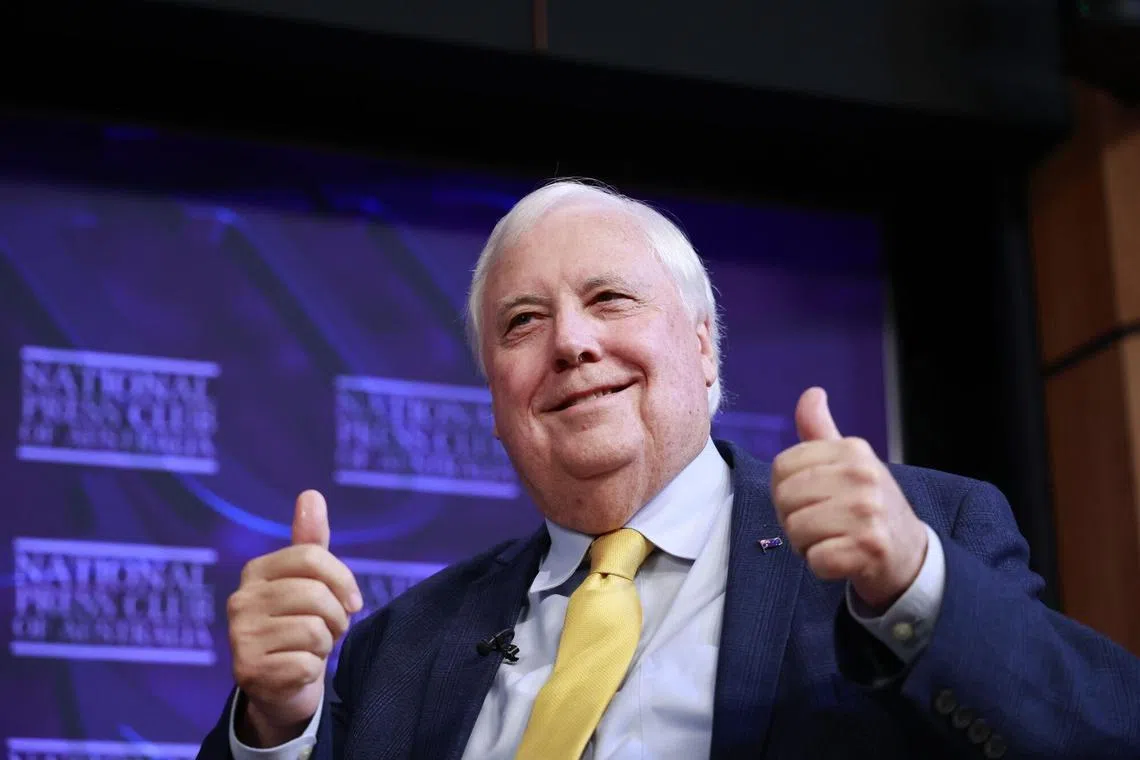Australia to cap political donations, but not in time to stop tycoon’s new Trump-like party
Sign up now: Get insights on Asia's fast-moving developments

Mr Clive Palmer, chairman of the Trumpet for Patriots, is expected to spend more than S$84 million on election advertising.
PHOTO: BLOOMBERG
Follow topic:
SYDNEY – Australian mining tycoon Clive Palmer – a colourful figure known for his big-spending political ventures – has opted for a pun-intended name for his reinvented political party
The name references his admiration for the populist, anti-migrant, pro-fossil fuels policies of US President Donald Trump.
Mr Palmer, who is worth an estimated A$23 billion (S$19 billion), is expected to spend more than A$100 million on advertising ahead of the election, due to be called within weeks and held in May. His party’s website states: “Australia needs Trump-like policies, which only Trumpet of Patriots can deliver.”
Australians have become all too familiar with the sudden barrages of advertising that promote Mr Palmer’s latest party ahead of federal elections.
In 2022, his party, then called the United Australia Party (UAP)
The UAP MP, Mr Ralph Babet, who was censured by the Senate in November 2024 for posting homophobic and racist comments on social media while celebrating Mr Trump’s election win, has been known as “the A$100 million man”.
Mr Palmer himself previously sat in Parliament – and once famously fell asleep in the Chamber – but later opted to avoid standing again and instead back other candidates.
This phenomenon of wealthy Australians giving millions to political parties and candidates is set to be scaled back under dramatic changes to Australia’s electoral funding laws.
The changes, introduced by the ruling Labor party and passed by Parliament on Feb 12, place caps on spending by donors and parties
Individual donors will be allowed to donate a maximum of A$50,000 to a candidate or party; previously, the amount was uncapped.
Donors must also disclose any donations that are A$5,000 or more, compared with the current level of A$16,900.
The laws also include spending caps, restricting parties to A$90 million per campaign and individual candidates to A$800,000.
All donations will effectively be disclosed in real time, ensuring that voters can learn of most big donations before the election date.
Candidates and parties that receive a specified minimum proportion of votes will receive public funding of A$5 per vote, up from the current level of A$3.50.
Public funding is designed to reduce the risk of corruption and the influence of lobbyists, as well as to help to ensure candidates do not need to continually raise funds.
But the new measures will not apply to the upcoming election, and will take effect only from the following one. The government said it did not want to introduce the changes so soon before a coming election.
Mr Palmer attacked the changes as a restriction on democratic freedoms and has threatened to launch legal action.
An expert on electoral funding, Professor Graeme Orr from the University of Queensland, told The Straits Times that the changes were a welcome but long overdue reform that will improve trust in the nation’s democracy.
“This is the most significant reform on disclosure and public funding in Australia in 40 years,” he said.
“We had some of the laxest political campaign and electoral funding laws in the socially democratic world... These laws won’t be a total panacea to address perceptions of people buying access to politicians or elections being skewed, but we needed laws like this.”
The rich and influential
Special Minister of State Don Farrell has described the changes as a historic reform that will tackle the influence of “big money”.
But the use of wealth and donations to try to wield influence and sway votes in Australia is not limited to Mr Palmer or to Trump-inspired populists.
Mr Simon Holmes a Court – a climate change advocate and the son of Australia’s first billionaire, businessman Robert Holmes a Court – has led efforts at recent state and federal elections to fund a group of progressive, mostly female, independent candidates. The group has become known as “the teals” because most use the colour teal in their campaign material. At the 2022 election, eight teal MPs were elected.
But critics, including some of the teal independents, say the new laws will benefit the major parties and will make it harder for independents to raise funds as they can no longer rely on large donations from wealthy patrons.
The major parties, on the other hand, have larger pools of donors and are likely to be relatively less affected than smaller parties.
An editorial in The Age newspaper on March 10 questioned Labor’s claim that the laws were necessary to ensure billionaires could not wield undue power.
“Whether that is the correct response or simply an attempt to feather its own nest by shoring up the two-party model remains to be seen,” it stated.
At the 2022 election, the major parties – Labor and the Liberal-National Coalition – received 68 per cent of the vote, although this was a decline from 85 per cent in 2007.
Still, experts say the laws may help to improve public perceptions of democracy and the electoral system.
Professor Joo-Cheong Tham, from Melbourne University, wrote on The Conversation website on Feb 14 that the changes would help to improve transparency and put limits on unfettered spending.
However, he said major parties will benefit because they can spread their spending to focus on “must-win seats”, even though independent candidates in these seats will be subject to the A$800,000 spending cap.
But, at least for one final election, Mr Palmer is currently taking every opportunity to flood the airwaves. In another tribute to his political hero, he has declared that his Trumpet of Patriots will “make Australia great again”.
Jonathan Pearlman writes about Australia and the Pacific for The Straits Times. Based in Sydney, he explains matters on Australia and the Pacific to readers outside the Oceania region.


